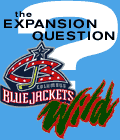 |
| Wednesday, August 2 Updated: August 8, 6:57 PM ET Different paths for expansion teams By Rob Parent Special to ESPN.com |
|||||||||||||||||||||||||||||||||||||||||||||||||||||||||||||||||||||||||||||||||||||||||||||||||||||||||||
|
If there's an aggrandized pressure on David Poile to push his youthful team farther along this season than it's ever been, he's not about to let it alter his carefully planned approach. No extra pressure given, no sudden panic moves taken.
Poile knows the best way for his Predators to keep winning popularity contests in Nashville is to stay the course -- no matter how slow the beat may seem. "We definitely have a plan and a philosophy for the way we're going to get this team to where we want it," the Predators' button-down general manager said. "To me, it's analagous to the turtle and the hare. The pace may be slower than some of us may like -- and in this case, that means the fans, ownership and the general manager -- but we know we're going to get there." One step at a time, with two years' worth of quiet tinkering, Nashville's first major sports franchise has undergone its first overhaul. Of the 26 pioneering players Poile named from a lectern at the 1998 NHL expansion draft, only four will show up on the Predators' 2000-01 training camp roster. "We're still in the growing stages," he said. "We've taken all of those players from the expansion draft and turned them into assets. We've traded a lot of them off, and have tried to get younger and build through the drafts. The plan is to do that and hopefully get some of those draft choices to play for you." So far, David Legwand, the second overall pick in '98, and Karlis Skrastins, last season's surprising rookie defenseman who was a ninth-round pick in '98, are the early NHL roster returns from the Predators' first two drafts. "That's all we have to show for our plan so far," Poile admitted. "But eventually, I think we'll get there. This year, we have a chance to be better, but honestly, I feel we're still a ways away from where we want to be." The Nashville Turtles, you understand. But how long will the fans keep understanding? In the seven magnificent markets that funded startup NHL franchises during the 1990s, fans have seen their teams run the gamut from unspeakable gore (Tampa Bay) to flirtation with glory (Florida). None of the teams have been raging successes, though there have been certain standards for current kids called the Minnesota Wild and Columbus Blue Jackets to live up to:
"Ottawa took its lumps early, and Tampa Bay has taken its lumps a little later," said Lightning GM Rick Dudley. "Ottawa had gotten the benefit of bringing in some very good young draft picks and turning them into a damned good hockey team. Tampa Bay was a little better early, but then paid the price. Phil was put under a little more pressure. In Ottawa at the time, it was a little easier to build a team."
Dudley, who served as Ottawa's GM for a season before taking the Tampa post last year, pointed out that players like Wade Redden and Chris Phillips "struggled mightily" in their rookie seasons, but that the Senators gave them time to develop. "Ottawa knew exactly what it was dealing with. They knew how to build a franchise," said Dudley. "The ownership in Tampa, quite frankly, knew only one way of building a sports franchise -- try to hit a home run. But you can't build a real team without developing your talent. Ottawa took a lot of lumps, but now they're reaping the benefits." Dudley is now trying to do things the way he learned with the Senators. Fifty-two separate Entrapped in a Lightning uniform last season were 52 separate players. Together, they managed to do something no Lightning team had done since 1997: Avoid finishing dead last in the league. Thank you, expansion. "If we show a glimmer; if we show this year that we belong in the NHL again, I believe we can win people back," Dudley said. "I think we'll be a lot better this year. We started last year doing what Ottawa did early. It's going to take awhile, but I think we'll get there. "I think for the Tampa Bay Lightning, the question is no longer whether or not they'll get good again. Right now for us, it's just a matter of when that's going to happen." But Dudley knows that challenge can't be scaled over a long period. Tampa Bay long ago spent its expansion-label allowance. Despite a real commitment from ownership for the first time in their history, the Lightning are working with an urgency to become a contending team for the NHL's postseason party. Or at least a competitive one. "For us, it's just been too long, and too far a fall," said Dudley. "Two years in a row, we finished dead last and last year we were next-to-last. They (the Lightning) got real bad at a time when the Bucs got very good. I believe there's room in this town for both teams to be accepted, but not at a time when our team is so bad." That's how it goes for so many teams of the new order: Still looking for a permanent niche after all these growing years.
Rob Parent covers the NHL for the Delaware County (Pa.) Times. His NHL East column appears every week on ESPN.com. |
|
||||||||||||||||||||||||||||||||||||||||||||||||||||||||||||||||||||||||||||||||||||||||||||||||||||||||||



